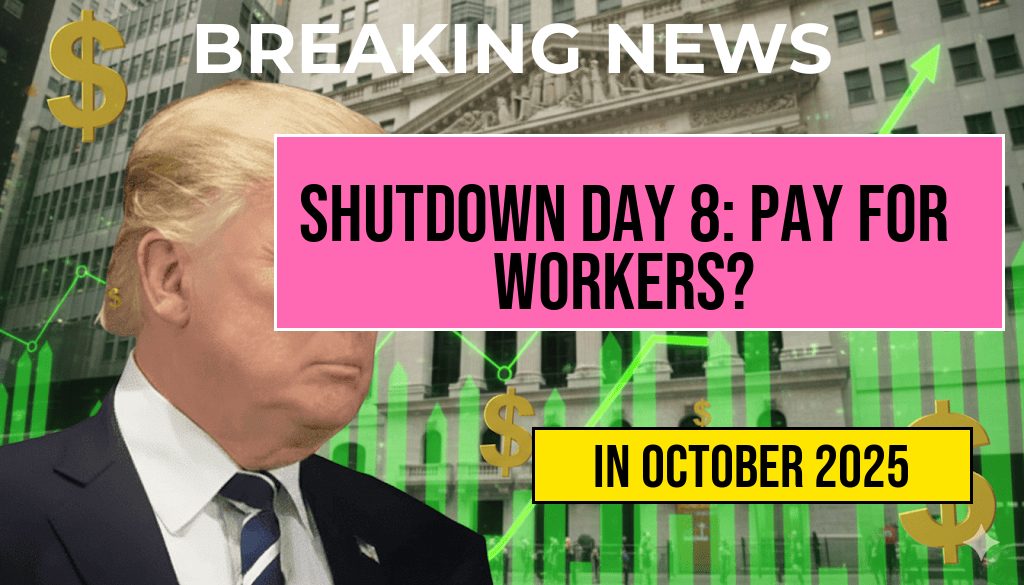The ongoing federal government shutdown has now reached its eighth day, leaving many federal workers uncertain about their paychecks. As negotiations between Congress and the White House continue, numerous employees are left wondering whether they will receive their full salaries or face the prospect of earning nothing during this impasse. The shutdown, which began when funding lapsed, has affected various government services and raised concerns about the economic impact on federal workers and the broader economy. With no clear resolution in sight, federal employees are concerned about their financial stability and the potential repercussions of a lengthy shutdown.
Understanding the Pay Situation for Federal Workers
As the shutdown drags on, federal workers are grappling with the implications of their pay status. Historically, during government shutdowns, employees are categorized as either “essential” or “non-essential.” Essential workers are required to continue their jobs without immediate compensation, while non-essential workers may be furloughed.
What Happens to Pay During a Shutdown?
When the government shuts down, the following scenarios typically unfold regarding federal employee pay:
- Essential Employees: Those who are deemed essential must continue to perform their duties. They will receive back pay once the government reopens, although they do not receive paychecks during the shutdown.
- Non-Essential Employees: These workers are furloughed and do not work during the shutdown. They may face the prospect of receiving no pay until the government reopens, although back pay is often provided historically.
The uncertainty surrounding the current shutdown has led to heightened anxiety among federal workers, many of whom rely on their salaries for day-to-day expenses. As the situation develops, workers are encouraged to stay informed about potential legislation that could impact their pay and benefits.
Impact on Federal Workers’ Finances
The financial implications of the shutdown are significant for many federal employees. According to a recent report by the Forbes, over 800,000 federal employees may be affected by the current shutdown. Many of these individuals live paycheck to paycheck, making any interruption in income potentially devastating.
Potential Legislative Solutions
Lawmakers are under pressure to expedite a resolution to the ongoing shutdown. Several proposals have emerged, including:
- Continuing resolutions to fund the government temporarily.
- Negotiations aimed at reaching a bipartisan agreement on budget priorities.
- Emergency measures to provide immediate financial assistance to affected workers.
Negotiations are ongoing, and many federal employees are closely monitoring the situation, hoping for a swift resolution that will allow them to receive their full pay as soon as possible.
The Broader Economic Impact
The government shutdown does not only affect federal employees; it has wider implications for the economy as a whole. When federal workers are not receiving paychecks, consumer spending can decline, which may lead to a slowdown in economic activity. According to economists, prolonged shutdowns can hinder overall economic growth.
| Shutdown Duration | Estimated Economic Loss |
|---|---|
| 1 Week | $1.6 billion |
| 2 Weeks | $3.2 billion |
| 4 Weeks | $6 billion |
As the negotiations continue, the potential for a prolonged shutdown remains a concern. The economic ramifications could ripple out beyond federal workers, affecting local businesses and economies dependent on federal spending.
Conclusion
As Day 8 of the shutdown unfolds, the uncertainty surrounding federal worker compensation remains a pressing issue. The fate of thousands of federal employees hangs in the balance as lawmakers work to find a resolution. It is essential for those affected to stay informed and prepared for the potential financial ramifications as the situation develops. With the stakes high for both employees and the economy, the coming days will be crucial in determining the outcome of this ongoing crisis.
Frequently Asked Questions
Question 1: What is the current status of federal workers’ pay during the shutdown?
The current status indicates that federal workers may receive $0 or full pay depending on the duration of the shutdown and legislative actions taken.
Question 2: How long has the government shutdown been in effect?
The government shutdown is currently in its eighth day, which has raised concerns about the financial implications for federal employees.
Question 3: Are there any provisions for back pay for federal workers after the shutdown ends?
Typically, there are provisions for back pay for federal workers once the shutdown is resolved, but this depends on congressional action to approve funding.
Question 4: What are the potential impacts of the shutdown on federal services?
The shutdown may lead to a reduction in federal services, affecting various government operations and programs until funding is restored.
Question 5: How can federal workers prepare for potential financial difficulties during the shutdown?
Federal workers can prepare by creating a budget, exploring emergency savings options, and staying informed about potential legislative developments regarding their pay.











